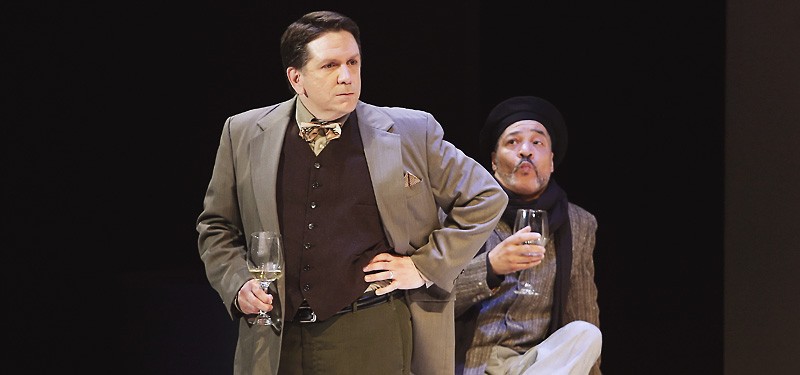So there's this painting. Abstract. White lines on a four-by-five-foot white canvas, executed by a trendy artist named Antrios. (Since his name is made-up, you might want to replace it with one like Warhol.) Serge, a successful dermatologist, has forked over a wad of bills to possess this presumed piece of art. But it's not enough for Serge to own a coveted Antrios; it is also important to the good skin doctor that his two best friends cherish it as much as he does. Therein lies the rub, and the underlying premise that inevitably transforms Yasmina Reza's Art from an evening of droll dexterity to a demolition derby: Serge's canvas serves as the hair trigger for round upon round of strafing as these three comrades discover how little they agree about anything.
Ever since this celebrated play debuted in the mid-1990s, debate has seesawed over whether Art is a wry exercise in glibness without content or, to the contrary, a substantive tome whose depth is disguised by its own gloss. This current production, now on exhibit in the main gallery at the Black Rep, won't resolve that debate, but it is refreshing to see that Art has lost neither its allure nor its universality. As translated from French by Christopher Hampton, the dialogue remains pithy, the topics, wide-ranging. (When you can persuade an audience to laugh at jokes about Seneca, you're doing something right.)
"You're just playing with words," Serge (Ron Himes) tells the disapproving Marc (Tim Schall) in one of their many heated rhubarbs over nothing of consequence. (This one concerns the definition of a classic.) In fact, the entire evening is wordplay, but the subtext beneath all this parsing strikes a nerve. Although Art is set in Paris, the playwright succeeds in capturing the elusive ambiguities that underlie male friendships everywhere. These three tend to socialize together rather than face up to the fact that they may be drifting apart. Lethargy, the playwright suggests, holds men together more tightly than the bonds of matrimony hold male and female.
As the play nears its end, the once-benign Yvan (Robert A. Mitchell) looks back with a kind of melancholy on "the evening of the white painting." At least that's the line in the script. But according to my notes, Mitchell spoke that line as "the night of the white painting." I hope he did, because "night" gives these confrontations a more ominous tone. Certainly, events of import are occurring here. "This is the end of a fifteen-year friendship," Serge says, with gravity in his voice. "Yes," Marc confirms. At which point — and this is not in the script — Ron Himes picks up his prized volume of Seneca and places it out of sight, out of reach, behind the bar. A simple gesture, yet the kind of telling action that delineates character in a play where shading is everything.
As Art was detonating onstage at the Grandel, outside on Grandel Boulevard another kind of comedy — this one, more sinister in nature — was playing out. The Great Grand Center Parking Meter Scam is now in full effect. The considerate souls who run Grand Center have produced an explanatory postcard that is left on car windshields. The sympathetic text would have us believe that being required to feed a meter until 10 p.m. is to be envied. ("And there's more good news...," the card brazenly proclaims.)
Two years ago Mayor Slay graciously appeared at the Kevin Kline Awards to tell the theater community — and these were his exact words — "We care about you." Now it would appear that the city is targeting that same arts-oriented community, theatergoing and music-loving alike, for exploitation. (We don't see meters being extended until 10 p.m. around Busch Stadium.) If you attend Art, be aware that there is no intermission, and the play is over by 9:40 p.m. Plan your quarters accordingly.


